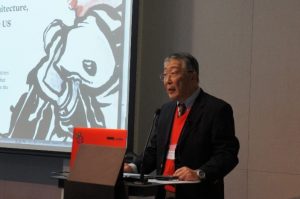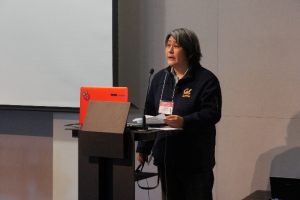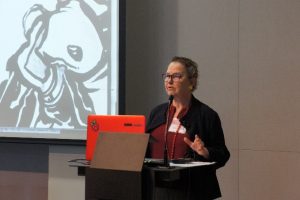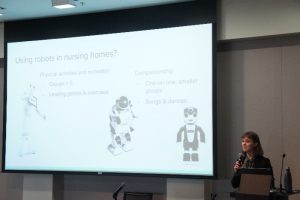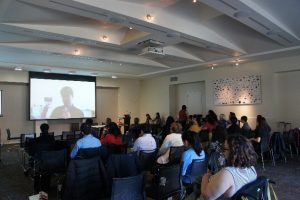Technology has the potential to greatly improve access and allow for the full participation of disabled individuals in society. Both Japan and the US have invested considerable sums in this effort, but often research is conducted apart from key stakeholders.
To discuss these issues, JSPS San Francisco (JSPS) and the Center for Japanese Studies (CJS) at the University of California, Berkeley (UCB) held a joint symposium titled “Crip Tech: Disability, Technology, Architecture, and Design in Japan and the US” at the David Brower Center in Berkeley on December 7 and December 8.
This symposium brought technologists, anthropologists, engineers, activists, educators, and other researchers working at the nexus of technology, access, and design together for a two-day symposium in Berkeley, the home of the independent living movement. The majority of the participants identify as disabled people.
The symposium started with opening remarks from Dana Buntrock, Chair of CJS. Toru Tamiya, Director of JSPS SF, also gave some context and background to the theme presented by Dr. Karen Nakamura, the organizing chair from UCB.
Each speaker gave a 20 minute presentation on their current research. Afterwards the speakers took comments and questions from the audience. The symposium also included a screening of two documentary movies, “Deej” and “Fixed”. The director and casts of these films then participated in a panel discussion on its production.
Finally, Dr. Karen Nakamura, the organizing chair of the symposium, presented the “CripTech Manifesto version 0.1” arguing that the “CripTech movement” needs to be inclusive and take a holistic view of disability. Dr. Nakamura drew attention to three specific concepts relating to the event’s theme:
- One needs to understand disability’s intersections with poverty, gender, sexuality racialized minoritization, access to healthcare and housing along with the effects of trauma, war, and dislocation
- No one can understand or speak for all disabilities and no one can understand or speak for all variations of their own disability.
- We cannot deem some disabilities “bad” that are not discussed (addiction and fatness being two examples of marginalized groups within the disabled community).
The symposium was a successful collaboration between the research communities in Japan and the US and bodes well for the potential future joint efforts in this exciting and important field.
JSPS, San Francisco will continue to support such symposia while maintaining its close relationship with UCB and CJS.
JSPSサンフランシスコ研究連絡センターでは、カリフォルニア大学バークレー校日本研究センターとの共催シンポジウム “Crip Tech: Disability, Technology, Architecture, and Design in Japan and the US”を2018年12月7日(金)、12 月8日(土)に開催しました。
日本の学術情報の発信、日本の大学の国際化支援、若手研究者への国際研鑽機会の充実を目的に当センターではシンポジウムを年数回開催しています
今回のシンポジウムについてカリフォルニア大学バークレ校教授の中村カレン氏が中心となり、障がい者支援に携わる日米の学者、技術者、研究者、活動家、及び当事者を招聘し障がい者支援に関する研究、社会実践等についての情報提供が行われ、日米の障がい者支援についての理解を深めることを目的に開催されました。ご参加ご協力をいただき誠にありがとうございました。




